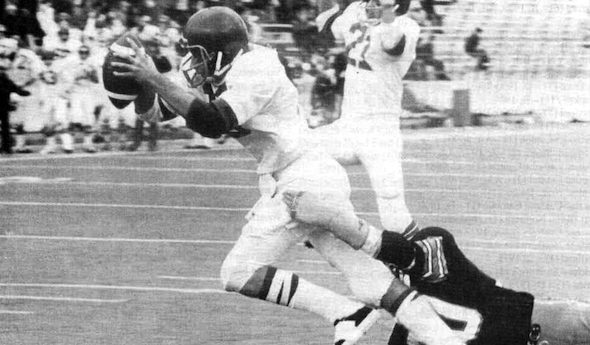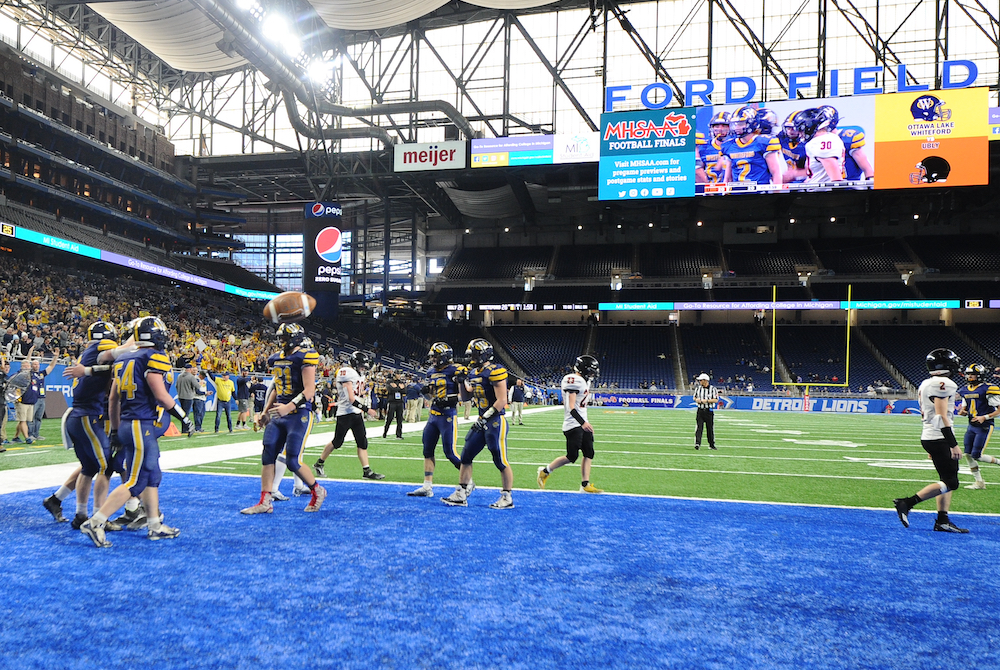
Moment: Streak-Ender Highlights 1st Finals
December 11, 2020
By John Johnson
MHSAA Director of Broadcast Properties
It’s been 45 years since the first MHSAA Football Playoffs took place, a two-week, 16-team tournament with the top teams of each of four regions in all four classes finally settling gridiron championships on the playing field.
In that first year, cries of “U.P. Power” thundered through the stands at Waldo Stadium in Kalamazoo and the new Perry Shorts Stadium in Mt. Pleasant as Crystal Falls Forest Park and Ishpeming claimed the 1975 titles in Classes D and C respectively. Bill Santilli ran wild for 179 yards on 37 carries and three touchdowns as the Trojans manhandled Flint Holy Rosary, 50-0, in the Class D game. But the Class C affair was one for the ages - perhaps the biggest upset in the history of the finals.
It was billed as David and Goliath. The mighty Hudson Tigers roared north to Mt. Pleasant riding a 72-game winning streak, which would stand as a national record until 1992; and is still a state record, only threatened once by a 69-game skein by Ithaca which ended in the 2014 Finals. Hudson had also laid claim to mythical state titles in Class C the three previous seasons. Ishpeming’s pedigree dated back to 1900, when it won the first of three straight - and of four in a five-year period - state titles in a championship conducted at and by the University of Michigan, primarily for the purpose of recruiting for Fritz Crisler’s Wolverines football program. The Hematites, having their best season in 15 years, had even lost a regular-season game along the way to a 9-0 Marquette squad that didn’t qualify for the playoffs.
On a cold, windy day at Central Michigan University, Ishpeming struck first and struck hard. Four minutes into the game, Tom Andriacchi blocked a Hudson punt and returned it to the Tigers' 10-yard line. Four plays later, quarterback Mark Marana kept the ball on the option and scored from two yards out. On its next possession just midway through the first period, the Hematites ripped off a 61-yard drive capped by a three-yard scoring run by Dave Farragh, and Ishpeming was up 16-0.
Hudson rallied following the ensuing kickoff with its first score, a 28-yard pass from Chris Luma to Dan Salamin, but the Hematites came right back with their third score of the opening frame, a 60-yard run by Mike Dellangelo to give Ishpeming all the points it would need.
The two teams traded scores in the second period, when Hudson then missed a golden opportunity to tighten things up just before halftime, fumbling at the Hematites' 2-yard line and with Ishpeming recovering for a touchback.
Dellangelo picked up a second TD in the third quarter, and finished the game with 156 of Ishpeming’s 336 rushing yards in the 38-22 victory.
“It wasn’t hard getting our guys up for the game,” Hematites coach Mike Mileski told Central Michigan Life after the game. “The emotion factor was a ready-made thing considering Hudson’s streak …”
Our action footage this week comes courtesy of Brian Sarvello, a member of that 1975 Ishpeming team. About 17 minutes film from that game was assembled with some of the local radio station call into a DVD that was shared with the team several years ago. We found it in a random internet search for this most recent series of MHSAA Moments, and appreciate Mr. Sarvello’s help in bringing it to you.
If you know of championship game footage from those pre-television years (1975-88) of the MHSAA Football Finals, we’d love to hear about it. Drop us a line at [email protected].
PHOTO: Ishpeming's Mark Marana works to break away from a tackler during the 1975 Class C Final. (MHSAA file photo).

Set, Ready, Challenge: 11-Player Football Finals Challenges New in 2022
By
Jon Ross
MHSAA Director of Broadcast Properties
November 25, 2022
New this year at the MHSAA 11-Player Football Finals is the opportunity for head coaches to challenge a call.
In previous years, all potential scoring plays and potential turnovers were automatically reviewed. That process will continue and now, under a limited set of circumstances, the head coach can challenge calls.
To do so, the head coach must first call a timeout. If a team has no timeouts remaining, they are not able to challenge a call. Challenges must be presented to the officials immediately after the timeout is granted. If the challenge is successful, the team will get its timeout back and have the ability to challenge one more call during regulation. A second successful challenge will not result in the ability to challenge a third call.
The following plays are reviewable by challenge:
- Complete/incomplete passes
- Runner/receiver in/out of bounds
- Runner ruled not down
- Forward progress spot as it relates to the yard to gain
- First touching of a kick
- Recovery of a ball in/out of bounds
- Forward/backward pass
- Penalties called on the field only for:
- Illegal forward pass
- Targeting or illegal helmet contact
- Pass interference only as it relates to the pass being previously tipped
NOTE: All other penalties called on the field are not reviewable. These include, but are not limited to: illegal formation, ineligible receivers downfield, illegal participation, illegal substitution or delay of game. If a penalty is not called by the officials on the field, the play can never be reviewed to retroactively call a penalty.
In overtime, challenges – like timeouts – reset. Each team has the ability to challenge one call for the entirety of overtime, but must have a timeout to use to do so. A successful challenge in overtime will not result in the ability to challenge a second call.
If a play is overturned in regulation or overtime, the replay officials will correct all aspects of the play including time, position of the ball and whether the clock will be started on the RFP or snap. The game clock or play clock may be reviewed only as it directly relates to the overturning of a call on the field.
There is no change to the review of potential scoring and potential turnover plays. Those plays are automatically looked at by the replay official and replay assistant. If the replay official can confirm the ruling on the field without stopping play, the official will do so. If more time is needed to review the play, the on-field referee will announce that and then will announce the replay official’s decision. For a play to be reversed, there must be indisputable video evidence that shows the original call was incorrect. Every attempt will be made to complete the review process in 90 seconds or less.
The addition of the coach’s challenge was approved by the MHSAA’s Representative Council at its May 2022 meeting.

